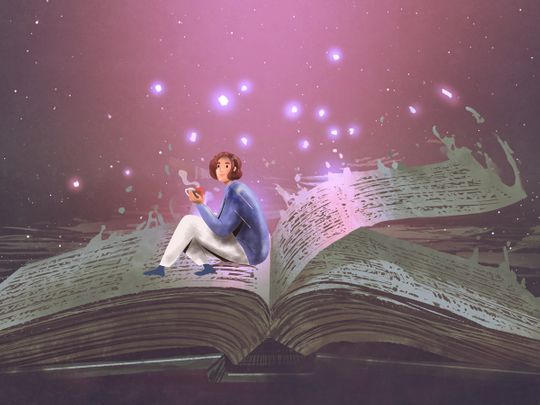
What could be more engrossing than reading a book? Of course, it’s reading one that talks about more books. Matt Haig’s recent best-seller, The Midnight Library, is a captivating tale of a young woman, Nora Seed, whose life is in tatters and this state of profound sadness drives her to end her life.
Upon awakening, she finds herself in a magical realm called ‘The Midnight Library’, a place where people wait until it is decided if they are dead or alive. The library contains endless books, each representing stories of varying realities depending on the choices made that led to them.
Nora is now faced with a possibility of exchanging her current dismal life for a new one; perhaps taking on a different career, fulfilling her childhood dreams, or rekindling relationships. In much the same way, books offer us a sort of vicarious lens into experiencing other imagined worlds and interesting lives.
American writer Sylvia Plath captures this feeling in a sublime way, “I can never read all the books I want; I can never be all the people I want and live all the lives I want … I want to live and feel all the shades, tones and variations of mental and physical experience possible in my life.”
Reading is an essential key to enlightenment, using the valuable knowledge derived from this expanse of human thought to elevate our lives. For centuries, libraries have been regarded as cradles of enlightenment. In modern times, libraries have had to reinvent their offerings from serene repositories of books to vibrant community spaces that regularly attract visitors.
Enhancing community cohesion
Libraries, big and small, play a vital role in bringing literacy to life via a number of creative services. Book clubs, art exhibitions, and educational workshops bring people with a shared interest together; thereby enhancing community cohesion and fostering friendships.
Books provide insights and knowledge that improve people’s well-being and help them make sense of their worlds and how they can shape their lives. Librarians are always there to act as custodians and curators of knowledge for people of all ages.
Libraries’ valuable knowledge resources also propel research and advancements in a multitude of sectors. Indeed, libraries are regarded as civil society’s greatest aspiration since they inspire people to elevate themselves through reading.
Libraries have done much to transform into sophisticated symposia. From an early age, toddlers and teens are invited to visit their local libraries to attend exciting storytelling sessions, book clubs, and literary workshops that inspire a lifelong affection for reading.
Additionally, students and professionals rely heavily on library resources throughout their learning and research endeavours. Digital technologies have also enabled libraries across the globe to connect with their audiences via eBooks, online talks, virtual literary cafés, literary podcasts, and informative blogs featuring reading recommendations.
Beautiful libraries are dotted around the world in plenitude, like sparkling stars in a midnight sky. Indeed, many cities consider public libraries as the heartbeat of any community, many of which have been lauded for their gorgeous architectural designs, unique and historical library collections, world-class equipment, and vibrant spaces.
Take, for example, Norway’s stunning Vennesla Library and Cultural Center, a multi-story facility designed with parallel wooden beams as ceilings and flooding with lots of natural sunlight.
This place houses a massive collection of books in addition to a cafe, personal study zones, open meeting spaces, a cinema, and classrooms for adult education courses.
Another fantastic example is the Seattle Central Library, a stunning 11-story glass and steel modern building that is regularly acclaimed as one of the most beautiful libraries in the world. The library has space to house 1.45 million books, in addition to a 275-seat auditorium and open spaces where visitors can meet, read, or use its computer lab.
Additionally, there are dedicated centers for children, teens and adult readers with its 10th floor enjoying breathtaking views of the city. Furthermore, the library organises an exciting calendar full of readings, lectures, and discussions by authors and other public figures that are all available on its podcasts.
Art exhibitions, performances, history talks, storytelling sessions, and film screenings are regularly hosted at the library.
Singapore has also done a marvellous job with its network of 28 public libraries. Every year, their libraries attract more than 24 million visitors who borrow more than 30 million library materials and go to more than 25,000 events organised by the libraries. Its digital content is impressive, with more than 800,000 eBooks and audiobooks.
To spearhead its mission of fostering knowledge, it organises a variety of educational workshops, virtual talks, and children’s storytelling sessions. Recent sessions covered topics such as design thinking, building a computer from scratch, gamification, coding for children, and personal finance.
In the UAE, local government agencies are designing public libraries as vibrant community spaces as well. Sharjah, which held the Unesco World Book Capital title in 2019, recently inaugurated its exquisite House of Wisdom library to much accolade and added a crown jewel to many of its cultural accomplishments.
The library is home to over 305,000 books, including digital books, in addition to having a dedicated children’s area, reading nooks, print-on-demand book stations, discussion halls and exhibition spaces, and meeting pods. The Mohammed bin Rashid Library, with its striking building resembling an open book, will be opening soon and is set to house over 4.5 million books.
Modern public libraries are at an interesting crossroads, faced with bridging their serene reading spaces with bustling community-centred spaces that spark learning, improve well-being, and bring together the masses for an exhilarating literary journey.
By embracing these 21st century ideals, public libraries can remain relevant to their patrons and be considered an essential part of their enlightenment.
Sara Al-Mulla is an Emirati civil servant with an interest in human development policy and literature




